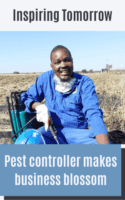“Women are not tools that can be used in the garden; they are the pillars of the world. Being a woman means you are a woman by creation not by how society defines you. Jesus Christ came through a woman. Every living soul is breathing out there today and all thanks to a woman.”
Those are the words of a young qualified speech therapist and audiologist, Tshililo Sadiki-Thovhakale, who strives to encourage fellow women to work hard and achieve more despite the unfavourable conditions and situations in which they find themselves.
A resident at Mpheni village in Limpopo, she has one of the best moments which she remembers as a first-time pupil at school. It was a situation where her educators thought that she had received good marks because she copied from her classmate.
“In the first term of my Grad One, I got position one. The class teacher thought I was copying from my classmate. I think I was just undermined because of the unfavourable background such as the village from which I came. The teacher moved me away from every kid in class. Term two came, and I was in position number one in my class.”
“I was one of the few pupils who had no pocket money, and for whom bread was a luxury in their lunchbox. Pap and chicken feet or tin fish were very popular in my lunchbox.”
She moved from rural Venda to Johannesburg, where she was admitted to a senior secondary school. She maintains that smoking dagga and other substances were prevalent among learners.
“The smoke from a cigarette that used to come out from the windows of the school toilets was similar to the fumes which wafted in the air when the bushes had caught fire. Boys and girls whiled away the time by puffing. Bullying and gangsterism in the school was also a nightmare. One had to belong to a certain gang to be safe and ‘belonging’ was for protection against bullying and robbery.”
In Gauteng, she has shared a shack with her father. The settlement had no electricity and it was full of ubiquitous flies. The family lived in fear of criminals who prowled the streets at nights and terrorised the residents.
“However, I enjoyed the many languages which people spoke – there were Vhavenda, Zulus, Pedis, Tswana, and Xhosas. Despite the criminal activities from some people who chose to thrive on hurting others, the kind of harmony in the settlement enthralled me.”
She would travel to and from school by train since it was the cheapest and most affordable, yet the most unsafe, mode of transport.
“We had Rough Riders or spara-para boys. Sometimes they would snatch your school bag or any belongings and take off before the train stops. Their main targets were Karrimor backpacks which were expensive by then.”
At the end of the year, Tshililo had failed Grade 11. She was so disappointed to the extent that she decided to relocate to Limpopo, where she registered at another secondary school which was notorious for violent acts and the abuse of substances.
“The school environment was not ideal for a Grade 11 maths and science learner, and it’s another reason why I had failed. One lesson that I learnt from failure is that sometimes we fail in life in order to gain more knowledge and make better decisions. This time around, I passed with flying colours.”
She was accepted to study towards a BA degree in speech-language pathology and audiology at Medical University of South Africa (MEDUNSA), which is currently known as Sefako Makgatho Health Sciences University (SMU).
“The course itself was very rare in our African communities. I had a study bursary from the Limpopo Department of Health Provincial Government which covered everything from accommodation, meals, fees and books. The qualification itself is a win-win as I am a dual qualified speech therapist and audiologist, so one can practice both at the same time.”
For Tshililo, being a speech therapist and audiologist means providing quality patient care, restoring client’s hope, coming up with solutions, and teamwork.
“We prevent, manage and rehabilitate communication disorders like language delays, aphasia, apraxia, and auditory-related pathologies like any hearing related issues, ear infections and disorders related to balance.”
“As a South African woman, I think it is important to support, educate and acknowledge one another especially in issues like depression, rape, business ideas, career choices and financial management skills. In order to achieve all that, we need to stop the so-called ‘Pull her down syndrome’ and start working together as women.”
***
Tell us: What did you take out from Tshililo’s story?






